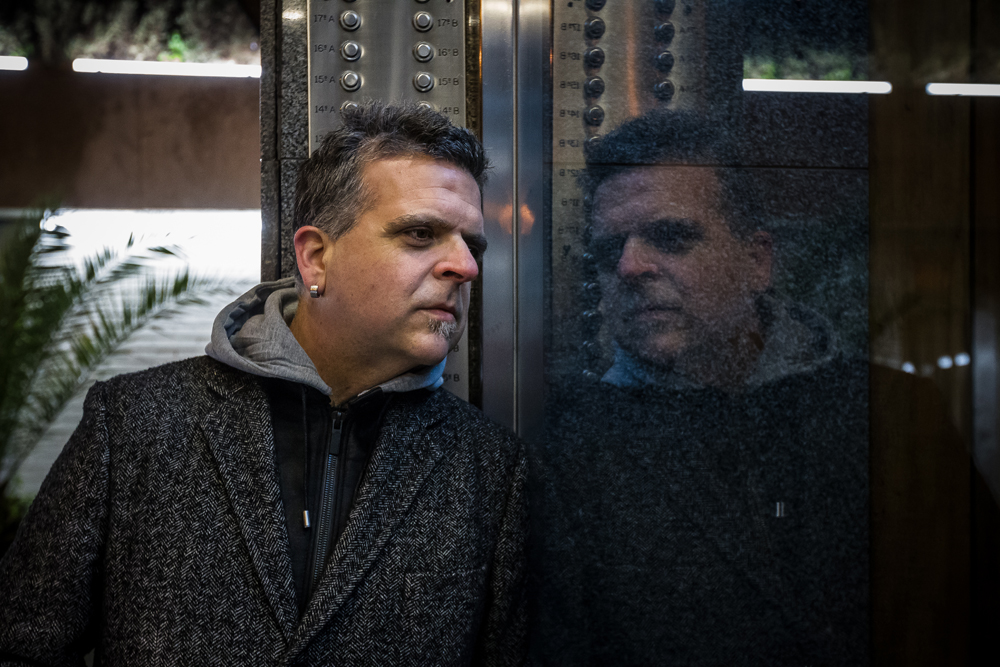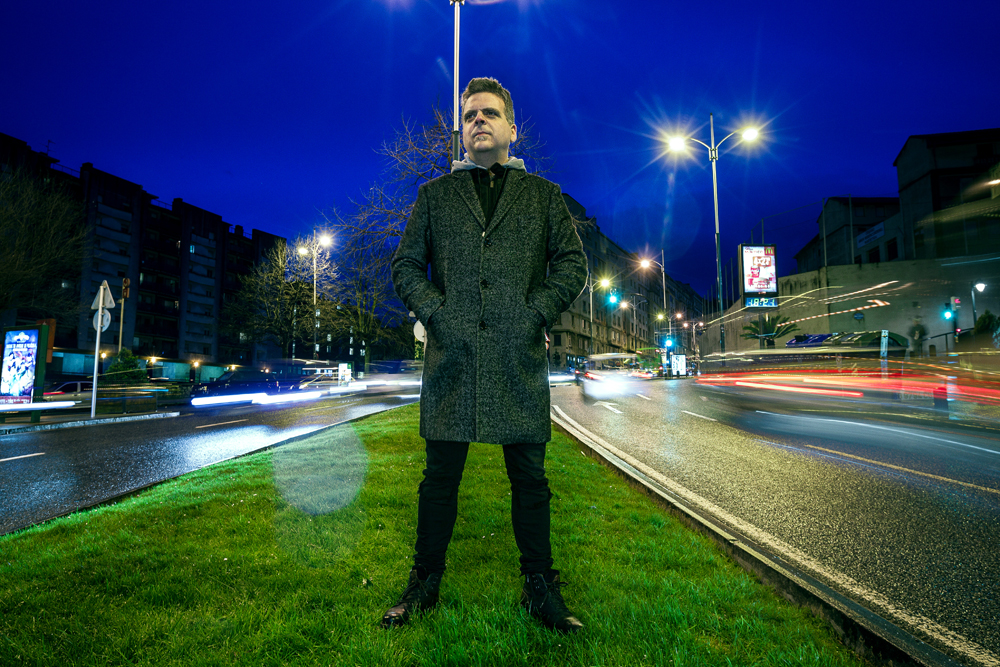
The Splitt 77 rider, Aritz Aranburu, was in charge of the first big blow. He did a psychological job, he led Rueda to look for other starting points. “And I felt free. My raw material is the song, and many times in the pop structure the stanza takes you to the bridge and the bridges to the motto. At one point, when you get out of that rail, you can try this and the other. I am not saying that you are the only one to get it out of there. You must be aware that there are other ways. I haven't gone to do things that aren't foreseeable. No more, I have felt free and something has brought me here.”
For example, Astinduo has been in charge of starting songs from keyboards. “Each instrument has its peculiarities, its inertia, and not starting from the guitar has necessarily led me to another place: I have a special way of singing and making melodies, and I think that is on the record, but that comes from other sounds. Not because I wanted to escape the previous Rafa, but because I started to see that I could get to places where I didn't come with guitars. Instrument change is what has brought me this disconnect. I feel freer to break that marriage.”
“Like some songs are eternal, others are deadly, unhealthy.”
This has influenced the way the guitar is played, sometimes it is used as a synthesizer, without using the six strings at once: “I don’t use it as a voice help, I’ve had to cut the wings for other instruments to fill that place. Guitar and piano have a wide harmonic range. The note to use to play in a group requires you to make a good choice. With the six strings, this clash occurs.”
The divorce with the guitar has also shook her waistline; there are songs that have the instinct to be dancers on the album – Little Cowboy, Nahikari – that suggest what the way may be for the future. “The truth is, I’m quite dancing. Shaking, reflecting the movements in music isn't bad. Also in the body I've felt a liberation, and that implies movement. I relate it to freedom. If it were for me, there would be more guitars, as I have always had the habit of making arrangements to play the baroque. An outside ear has had to tell me that a song doesn’t need more.”
It is the producer Jon Agirrezabala, who, with humility, put his music in the producer’s ear in search of advice and, above all, reflections. “I would say that Jon’s role is not so clear on the aesthetic level. Before I gave her the kiss, the songs had that tone you hear. Jon has been a facilitator. He has made many proposals to me. I knew where I wanted to go and he saw this field more clearly, it has been the guide in that direction I have given him.” Producer Rafa Rueda has been reflected in the mirror of Jon. “I’ve learned a lot. For me it has been an exercise of humility. In this case, I realized that thanks to Jon, what I was looking for was closer than I thought. I've done that work with others and I haven't been so aware of how hard it is to see flies in one's nose when you see them so easily in the nose of their peers. Now I know myself better.”
Irreversible decisions: for example, the work on the structures of songs – as the song Maryana demonstrates well – or above all the way of singing: what seems least to have changed is the key to this atmosphere. “All of a sudden, Jon told me that the tension of the song should be removed. What do you do for it, change the melody, or lower the pitch? And starting to sing in a grave pitch was like stepping on another planet for the first time. Demonstration of such gravity frequencies. It's a very physiological exercise. You realize you don't have to throw that much air to sing. Reveal your instrument, the voice in this case. How strong it is to sing relaxed in my music. That is the most important thing I have achieved. If I had discovered it in my previous work, the result would have been completely different. I think I've done some interesting things, but they haven't been rounded up by the use of the song. Since the time of PiLT, I started working in another stylistic field, without doing it well. If the songs of the first albums I have lowered the tone… Well, when you record a record, you play with eternity. What you do there is forever.”

But not every song comes to eternity, it has songs that have died to it. “If it wasn’t, it would be a perfect singer-songwriter. Not all my songs are good. Only alive. It's a matter of taste. Maybe you've died for me, and for another you haven't. Some songs are eternal, others are mortal, unhealthy. We could also make a long list of abortions.” Does the direct bring them to life? “Or listen to taste, feel close. The listener also gives them life.”
But if songs can die, when are songs born? “I always say that a song is not a song until the text is collected and it is well fitted.” But the milestone is often the moment when you feel the need to teach, that moment of uncertainty. “I let him stay for eternity in the reaction of others.”
“Each area has its own folk. Mine doesn’t remember the grass, but it also has a folk that is ours.”
This time his classmates' ears perceived an urban tone to the song's sonority and paid attention to their friends. “The city is in the words, because music existed before the city. The city has been the excuse to talk about people, about us. But in music there was that tone, something that can be defined as urban folk. These are not bucolic landscapes, but there are also mountains, forests, neons and bars. Each area has its own folk. Mine doesn’t remember the grass, but it also has a folk that is ours.”
“Then I decided that all songs would bear people’s names and stories, and with the most diverse views possible. For that I said the range of writers (5-6 writers). There are people who write very differently, but they've all written that I was in the head. Therefore, their writing also changed, and it is often difficult to know to whom each text belongs; thus, a singular unity is achieved”.
Have you also divorced from writing? “I don’t enjoy writing as much as making music. I don't have that level of dexterity. My texts have often not been at the same level as music. I had two possibilities. Some say that the most honest thing is to write what you have inside. But what would be better for the outcome? That I wrote and that the result was not so good? Or propose that work to people who write a lot better than I do? And I bet on the result, on the song. The important thing is not me, it's the song."
This eternity requires the elimination of all Orthodox. “I think everything is changing. There is nothing intangible if the result improves. They're the option to create. There are people who only want music when they take it first. It has its charm. But the fact of accepting the 20 also has its charm, if you're going to look for something and you get it. Both are valid. I can play for a moment to be that way, as an exercise. But the choice would be favorable to the concept, not to the result. I have not raised any of these activities. I am always willing to change, if they are favorable to the outcome.”
Aposapo + Mäte + Daño Dolor
When: April 5th.
In which: In the Youth Center of Markina-Xemein.
---------------------------------------------------------
I’ve made my way to the cheese house with the shopping cart full of vegetables, and we’ve spent the evening cutting... [+]
Poliorkêtês
Kerobia
Autoekoiztua, 2025
--------------------------------------------------------
Azken aldian, lerrootan asko nabil hausnartzen musikak izan beharko lukeen “misio historikoaz” eta abarrez. Eta, nolabait, zer egin beharko lukeen... [+]
On March 7, the 150th anniversary of the birth of Maurice Ravel, the best Basque composer of all time. And in LA LUZ a tribute was paid to this composer, recalling the influence of the famous Bolero on the collective imagination.
By chance, Deutsche Grammophon has just released... [+]
Olatz Salvador
Noiz: martxoaren 15ean.
Non: Deustuko jaietan.
------------------------------------------------
Martxoak beti du deustuarrontzat kolore berezia; urtero ospatzen ditugu jaiak, San Jose egunaren bueltan. Bi asteburu bete festa, eta urtetik urtera Deustuko... [+]
Antifa hardcore
Lee-Kore + Hoben
Autoekoizpena
---------------------------------------------------------
Tamalez ez da ohikoa Arrasaten hardcore kontzertuak egitea, bestelako musika eszenak nagusitzen direlako. Hala bada, joan den larunbatean herriko gazte batzuen... [+]
Hunkituta eta ilusioz egin dut Iruñetik Oronozerako bidea. Maite dut Olaia entzutea, baita hizketan ere. Herriko farmaziaren ondoan autoa utzi eta balkoitik agurtu naute hark eta bere zakur Arak. Grabagailua martxan jarri aurretik, bueltaxka egin dugu frontoira eta Arak... [+]
Bizitza eztia
Verde Prato
Plan B Records, 2024
--------------------------------------------------------------
Ousmane Sembène zinemagile senegaldar ospetsuari galdetu zioten ea bere pelikulak Europan ulertzen ote ziren. Erantzuna, epikoa: “Izan gaitezen... [+]
Inoren Ero Ni + Lisabö
Noiz: martxoaren 14an.
Non: Gasteizko Jimmy Jazz aretoan.
----------------------------------------------------
Izotz-arriskuaren seinalea autoko pantailatxoan. Urkiola, bere mendilerro eta baso. Kontzertuetara bideko ohiko errituala: Inoren... [+]
FITXA
Zer: OLBEk antolatutako Gaetano Donizettiren ‘La favorite’ opera.
Nork: Euskadiko Orkestra Sinfonikoak (zuzendaria: Riccardo Frizza) eta Bilboko Operaren Abesbatzak (zuzendaria: Boris Dujin).
Noiz: otsailaren 18an.
Non: Bilboko Euskalduna Jauregian.